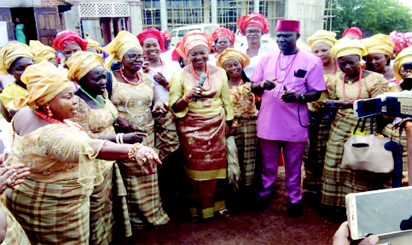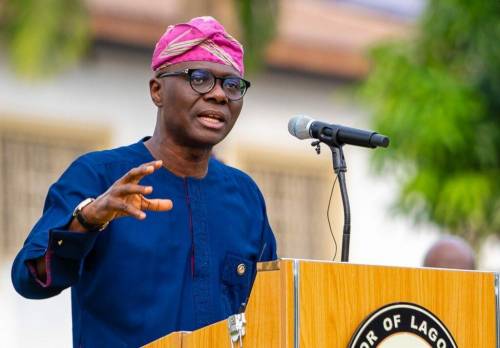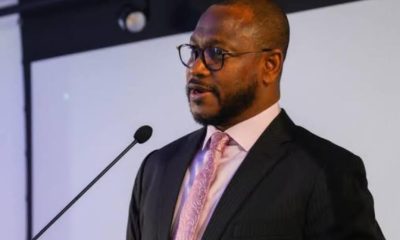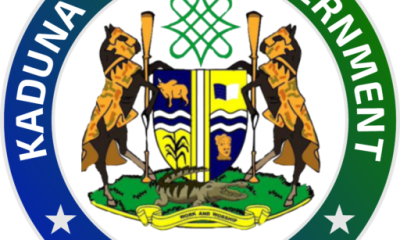Metro
APC Chieftain Lauds Ndigbo’s Romance with APC

By Ateed Yusuf, Abuja
The Coordinator APC South East Forum Mr. Agu Okechukwu Samuel has described the identification and recognition of APC by Ndigbo as a welcome development aimed at promoting peaceful coexistence in the country.
Samuel made this known while delivering a lecture in Kwali entitled, “The importance and participation of Ndigbo in APC and Abuja politics” at an occasion organised by APC South East Forum Kwali chapter.
The APC Chieftain noted that the development is going to do good to Ndigbo like in the past where most Ndigbo see APC as Hausa or Muslim political party.
Samuel who is also the Chief Executive Officer (CEO) of Lion Property Ltd Gwagwalada tasked political class in the FCT to take the advantage of the population of Ndigbo, their consistency, commitment and dominance in commerce and industry to win elections.
Samuel expressed happiness that at present the Ndigbo in the FCT and the Nation at large have migrated from being members of regional party to join national party the All Progressive Congress (APC).
The Coordinator cited some notable Igbos who are leaders of the APC in their respective states, just as he mentioned Ebonyi and Imo States Governors, Ministers and lawmakers as die heart of the ruling All Progressive Congress (APC).
“Ndigbo simply means a section of bonafide citizens of Nigeria, who understand and speak Igbo as their medium of communication amongst them, scattered all over the World in search of greener pasture, with their ancestral home at the Eastern part of Nigeria, ie Abia, Anambra, Enugu, Ebonyi, Imo and some parts of Delta and Rivers States.
“They are the one of the most populated ethnic Nationality in Nigeria, most accommodative and adaptive citizens of Nigeria. Ndigbo create home and maintain home outside their ancestral home, understand and speak language of their host community easily.
“Ndigbo dominance and control commerce and industry in Nigeria and other West African countries. In any Local community you enter in any part of Nigeria, you must meet an Igbo man or woman running his or her business in that community or hamlet,” he explained.
Metro
Infrastructure: We Have Renovated, Furnished 60 Schools in FCT – Wike

The Minister of the Federal Capital Territory (FCT), Mr Nyesom Wike, says the FCT Administration has renovated and furnished more than 60 public schools across the territory.
Wike stated this after inspecting some ongoing projects in Gwagwalada and Kwali Area Councils of the territory on Friday.
He explained that beyond road projects, the FCT Administration had invested hugely in improving critical infrastructure in the health and education sectors among others.
According to him, every sector will receive the needed attention, and no one will be left behind.
“We have done a lot of work in schools. The schools we have renovated and furnished are more than 60 so far.
“I can tell you that no sector would be left abandoned, every sector will be focused on.”
The minister, however, pointed out that “good road network is what brings development.
“When there are no roads, which school will you go to?
“When there are no roads, which hospital will you go to?
“So first of all, the key thing that drives development is a good road network all over the world.
“If you’re talking about agriculture, how will you go and harvest your produce when there is no road?”
Wike said that the farming communities along the A2 to Pai road would be happy that they now have a road network to take their farm produce to the city and markets to sell.
He added that good road networks also impacted positively in reducing insecurity.
He explained that when people commit offences and there was no road to chase them, it would become a problem.
“But when you see this kind of road with streetlights, you will have to think twice before you commit any offence,” the minister said. (NAN)

Lagos State Govt. Set To Launch Monthly Rent Payment Scheme
The Lagos State Government says it is finalizing plans to introduce monthly and quarterly rent payment system aimed at easing financial burden on residents, especially low-income earners.
The Commissioner for Housing, Mr Moruf Akinderu-Fatai, disclosed at the 2025 Ministerial Press Briefing to commemorate Gov.
Babajide Sanwo-Olu’s second year in office on Tuesday.He said the initiative was part of broader efforts to make housing accessible and affordable for residents.
He recalled that the state had earlier launched a rent-to-own housing scheme which allows tenants to make an initial five per cent down payment and spread the balance over a 10-year period.
“That initiative was well-received, and its success encouraged us to explore new ways to reduce the pressure of yearly rent payment,” he said.
According to him, many tenants, particularly those with modest incomes, find it difficult to pay rent annually.
Akinderu-Fatai added that “we believe that monthly or quarterly payment options will give people more breathing space and reduce the stress associated with sourcing lump sums.”
He noted that the government was currently engaging landlords, property developers and other key players in the real estate sector to understand the challenges and fine-tune the policy before rolling it out.
He said “of course, there are issues to resolve — things like landlord cooperation, payment tracking and enforcement. But discussions are ongoing and we are listening to all sides.”
The commissioner added that the government was fully committed to the plan, working diligently to implement a pilot phase in selected areas of the state.
“This is not just policy on paper. We are making real progress. We know what this means for many families, and we are determined to make it happen,” he stressed. (NAN)
Metro
NCPC Congratulates Christians Worldwide on Emergence of Pope Leo XIV

Bishop Stephen Adegbite, the Executive Secretary of the Nigerian Christian Pilgrims Commission (NCPC), has congratulated Catholics and Christians worldwide on the election of Pope Leo XIV as the 267th Pontiff of the Catholic Church.
Adegbite said this in a statement signed by Mr Celestine Toruka, the Deputy Director and Head, Media and Public Relations of NCPC on Friday in Abuja.
Toruka quoted the NCPC boss as saying “we congratulate Pope Leo XIV on his historic election as the first American to ascend the seat of St.
Peter.“We urge His Holiness to use his new role as the leader of the Catholics globally to preach peace and promote dialogue in addressing the myriad of societal ills plaguing humanity.
”He commended the 133 cardinals for their unanimity of purpose, resilience and forthrightness in choosing the new Bishop of Rome.
He expressed appreciation to Catholics and non-Catholics alike for their fervent prayers, which he believed contributed to the smooth election of the new Pontiff.
Adegbite noted that he was particularly touched by the new pope’s inaugural speech, in which he affirmed that the Church should serve as platform for building bridges.
He added that “this is exactly what the world needs now. We wish Pope Leo XIV good health of mind and body to carry out his apostolic duties.
“We pray that the Good Lord will grant him the grace to take the Catholic Church and all Christians to a higher pedestal of spirituality.”(NAN)
























